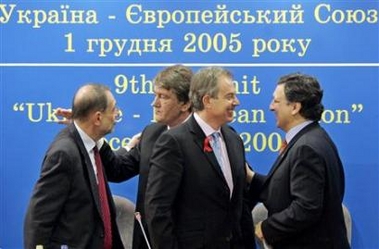|
Blair accused of 'surrender' over EU budget deal
(AFP)
Updated: 2005-12-02 09:01
British Prime Minister Tony Blair was accused of "surrender" on the stalled
European Union budget amid indications his government is set to give up part of
the country's rebate to secure a deal.
Blair -- who is making a last-ditch bid to secure the support of new
member states before a meeting of all 25 EU leaders in Brussels in two weeks'
time -- will table a formal budget proposal on Monday.
But even though Blair insisted Wednesday there is no question Britain will
give up its entire rebate, officials in London indicated it could forgo some of
its rebate cash that would otherwise come from poorer eastern European
countries.
Reaction -- both from British politicians and the country's newspapers -- was
damning and showed a rare degree of consensus.
The main opposition Conservatives' Europe spokesman Graham Brady told BBC
radio: "Of course this is surrender. It is precisely what we were worried was
going to happen all along.
"What you have to remember is that the rebate is something that we don't have
to give up at all. We have an absolute veto. If Mr Blair is prepared to
negotiate seriously and play hardball, he doesn't have to give it up at all."
The conservative Daily Mail -- one of the leading critics of the EU -- led
the critics, headlining Friday's front page story "The Great Betrayal" of the
rebate won by former Tory prime minister Margaret Thatcher in 1984.
Daily tabloid The Sun -- not noted for its love of the EU -- accused Blair of
"waving the white flag" on the rebate.

EU Commission
President Jose Manuel Barroso (R) laughs with British Prime Minister Tony
Blair (2nd R) while Ukrainian President Viktor Yushchenko (2nd L) talks
with EU foreign policy chief Javier Solana (L) in Kiev December 1, 2005.
[Reuters] | Its dispatch began: "Tony Blair last night caved in and started handing back
hard-won taxpayers' cash to Brussels."
The left-of-centre Guardian was more circumspect, headlining its report
"Blair accused of a sell-out over EU rebate deal".
It assessed the new deal "amounted to an admission that the six-month UK
presidency of the European council of ministers will end on January 1 without
the breakthrough on reducing EU farm subsidies".
Both the right-of-centre Daily Express and The Financial Times also talked of
"surrender", with the FT calculating the new deal could cost British taxpayers
an extra one billion pounds (1.47 billion euros, 1.73 billion dollars) a year.
Even one of the most pro-European of newspapers, The Independent, said Blair
had "admitted defeat" in his battle to reform farm subsidies, one of the main
sticking points in achieving a deal.
It said reducing the value of Britain's annual rebate was a "significant
climbdown" but presented the only hope of a deal against France's steadfast
refusal to accept changes to farm spending up to 2013.
The Times was more matter-of-fact but said: "The admission that the current
budget system is too favourable to Britain is a dramatic U-turn for the
Government, which had previously maintained that the rebate remains fully
justified by the fact that the UK gets so little from farm subsidies."
The conservative Daily Telegraph stood alone in making no comment on the new
proposals, but said Blair had lost former allies in eastern Europe because of
the revised plans.
|